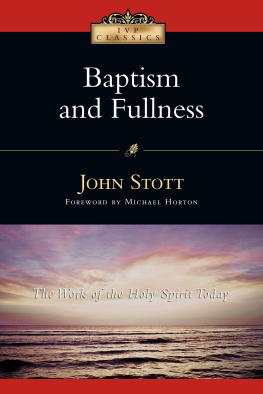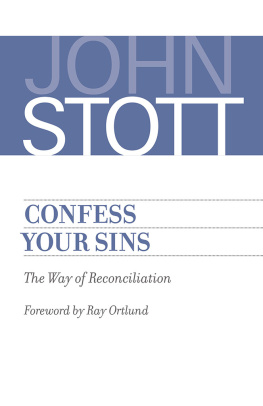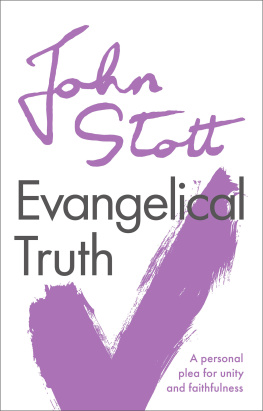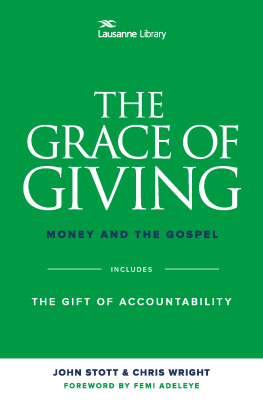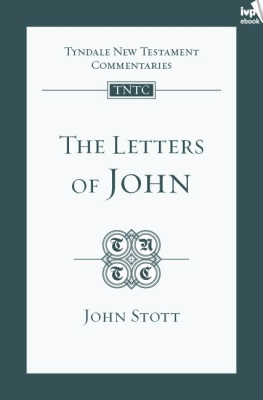Stott John - Reading Romans with John Stott
Here you can read online Stott John - Reading Romans with John Stott full text of the book (entire story) in english for free. Download pdf and epub, get meaning, cover and reviews about this ebook. year: 2016, publisher: InterVarsity Press, genre: Religion. Description of the work, (preface) as well as reviews are available. Best literature library LitArk.com created for fans of good reading and offers a wide selection of genres:
Romance novel
Science fiction
Adventure
Detective
Science
History
Home and family
Prose
Art
Politics
Computer
Non-fiction
Religion
Business
Children
Humor
Choose a favorite category and find really read worthwhile books. Enjoy immersion in the world of imagination, feel the emotions of the characters or learn something new for yourself, make an fascinating discovery.

- Book:Reading Romans with John Stott
- Author:
- Publisher:InterVarsity Press
- Genre:
- Year:2016
- Rating:5 / 5
- Favourites:Add to favourites
- Your mark:
- 100
- 1
- 2
- 3
- 4
- 5
Reading Romans with John Stott: summary, description and annotation
We offer to read an annotation, description, summary or preface (depends on what the author of the book "Reading Romans with John Stott" wrote himself). If you haven't found the necessary information about the book — write in the comments, we will try to find it.
Reading Romans with John Stott — read online for free the complete book (whole text) full work
Below is the text of the book, divided by pages. System saving the place of the last page read, allows you to conveniently read the book "Reading Romans with John Stott" online for free, without having to search again every time where you left off. Put a bookmark, and you can go to the page where you finished reading at any time.
Font size:
Interval:
Bookmark:
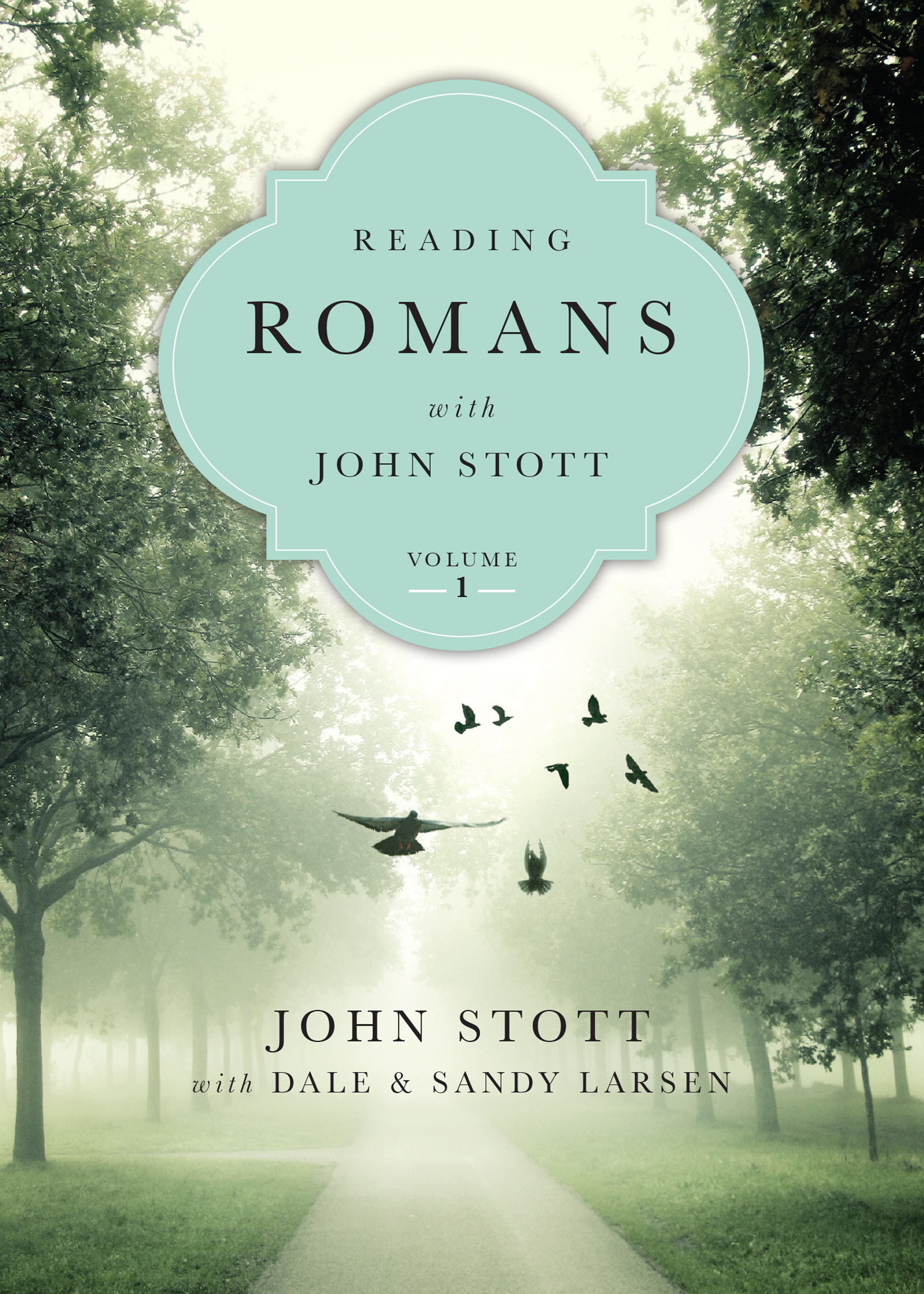
InterVarsity Press
P.O. Box 1400, Downers Grove, IL 60515-1426
ivpress.com
2016 John Stotts Literary Executors
All rights reserved. No part of this book may be reproduced in any form without written permission from InterVarsity Press.
This volume is abridged and edited from The Message of Romans 1994 by John R. W. Stott, originally published under the title Romans: Gods Good News for the World, by permission of Inter-Varsity Press, England. Some of the discussion questions are from Romans: Encountering the Gospels Power 1998 by John R. W. Stott, originally published by InterVarsity Press, Downers Grove, Illinois, USA.
InterVarsity Pressis the book-publishing division of InterVarsity Christian Fellowship/USA, a movement of students and faculty active on campus at hundreds of universities, colleges and schools of nursing in the United States of America, and a member movement of the International Fellowship of Evangelical Students. For information about local and regional activities, visit intervarsity.org .
All Scripture quotations, unless otherwise indicated, are taken from THE HOLY BIBLE, NEW INTERNATIONAL VERSION, NIVCopyright 1973, 1978, 1984, 2011 by Biblica, Inc.Used by permission. All rights reserved worldwide.
Cover design: Cindy Kiple
Images: Yolande de Kort / Trevillion Images
ISBN 978-0-8308-9332-4 (digital)
ISBN 978-0-8308-3191-3 (print)
Library of Congress Cataloging-in-Publication Data
Names: Stott, John R. W., author. | Larsen, Dale, author. | Larsen, Sandy,
author. | Stott, John R. W. Message of Romans.
Title: Reading Romans with John Stott / John Stott with Dale and Sandy Larsen
; with questions for groups or individuals.
Description: Downers Grove : InterVarsity Press, 2016. | Series: Reading the
Bible with John Stott (RBJS) | Vol. 1. | This volume is abridged and
edited from The Message of Romans... | Includes bibliographical references.
Identifiers: LCCN 2016011664 (print) | LCCN 2016017713 (ebook) | ISBN
9780830831913 (pbk. : alk. paper) | ISBN 9780830893324 (eBook)
Subjects: LCSH: Bible. Romans, I-VIII--Devotional literature.
Classification: LCC BS2665.54 .S76 2016 (print) | LCC BS2665.54 (ebook) | DDC
227/.107--dc23
LC record available at https://lccn.loc.gov/2016011664

During John Stotts life from 1921 to 2011, he was one of the worlds master Bible teachers. Christians on every continent heard and read John Stotts exposition of Scripture, which was at once instructive and inspiring. With over eight million copies of his over fifty books sold in dozens of languages, it is not surprising that Time magazine recognized him in 2005 as one of the 100 Most Influential People in the World and Christianity Today called him evangelicalisms premier teacher and preacher. At the core of his ministry was the Bible and his beloved Bible Speaks Today series, which he originated as New Testament series editor. He himself contributed several volumes to the series, which have now been edited for this Reading the Bible with John Stott series.
The purpose of this volume is to offer excerpts of Stotts The Message of Romans in brief readings, suitable for daily use. Though Stott was himself an able scholar, this series avoids technicalities and scholarly debates, with each reading emphasizing the substance, significance and application of the text.
Following each set of six readings is a discussion guide. This can be used by individuals to help them dig more deeply into the text. It can also be used by study groups meeting regularly. Individuals in the groups can go through the six readings between group meetings and then use the discussion guide to help the group understand and apply the Scripture passage. Discussions are designed to last between forty-five and sixty minutes. Guidelines for leaders at the end of this volume offer many helpful suggestions for having a successful meeting.
If you are a group member, you can help everyone present in the following ways:
- Read and pray through the readings before you meet.
- Be willing to participate in the discussion. The leader wont be lecturing. Instead all will be asked to discuss what they have learned.
- Stick to the topic being discussed and focus on the particular passage of Scripture. Only rarely should you refer to other portions of the Bible or outside sources. This will allow everyone to participate on equal footing.
- Listen attentively to what others have to say. Be careful not to talk too much but encourage a balanced discussion among all participants. You may be surprised by what you can learn from others. Generally questions do not have one right answer but are intended to explore various dimensions of the text.
- Expect God to teach you through the passage and through what others have to say.
- Use the following guidelines and read them at the start of the first session:
- We will make the group a safe place by keeping confidential what is said in the group about personal matters.
- We will provide time for each person to talk who wants to.
- We will listen attentively to each other.
- We will talk about ourselves and our own situations, avoiding conversation about others.
- We will be cautious about giving advice to one another.
John Stott had an immense impact on the church in the last half of the twentieth century. With these volumes readers today can continue to benefit from the riches of the Bible that Stott opened to millions.

Ever since I became a Christian, I have enjoyed a love-hate relationship with Romans because of its joyful-painful personal challenges. It began soon after my conversion, with my longing to experience that death to sin which Romans 6 seemed to promise. I toyed for many years with the fantasy that Christians are supposed to be as insensitive to sin as a corpse is to external stimuli. My final deliverance from this illusion was sealed when I gave a series of talks on Romans 58. Next, Pauls devastating exposure of universal human sin and guilt in Romans 1:183:20 rescued me from that superficial evangelism which is preoccupied only with peoples felt needs. Then there was Romans 12 and its demand for our wholehearted commitment in response to Gods mercies, and Romans 13, whose teaching about the use of force in the administration of justice made it impossible for me to remain a total pacifist. As for Romans 8, although I have declaimed its final triumphant verses at innumerable funerals, I have never lost the thrill of them.
Paul, although a man of his age who addressed his contemporaries, also speaks to all people of every age. I have not been surprised to observe how many contemporary issues Paul touches on in Romans: enthusiasm for evangelism in general and the propriety of Jewish evangelism in particular; whether homosexual relationships are natural or unnatural; whether we can still believe in such unfashionable concepts as Gods wrath and propitiation; the historicity of Adams fall and the origin of human death; the fundamental means to living a holy life; the place of law and of the Spirit in Christian discipleship; the distinction between assurance and presumption; the relation between divine sovereignty and human responsibility in salvation; the tension between ethnic identity and the solidarity of the body of Christ; relations between church and state; the respective duties of the individual citizen and the body politic; and how to handle differences of opinion within the Christian community. And this list is only a sample of the modern questions which, directly or indirectly, Romans raises and addresses.
Font size:
Interval:
Bookmark:
Similar books «Reading Romans with John Stott»
Look at similar books to Reading Romans with John Stott. We have selected literature similar in name and meaning in the hope of providing readers with more options to find new, interesting, not yet read works.
Discussion, reviews of the book Reading Romans with John Stott and just readers' own opinions. Leave your comments, write what you think about the work, its meaning or the main characters. Specify what exactly you liked and what you didn't like, and why you think so.

